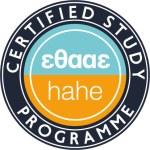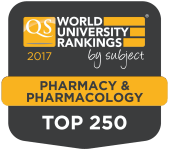Cosmetology - Preparation and Evaluation of Cosmetic Products
The subject of this postgraduate program is the theoretical and practical education and training of young scientists in the design, production (in small and industrial scale) and evaluation (quality control, efficiency and safety) of cosmetic products, both theoretically and practically.
The aim of the program is:
- to cover research and training needs in the field of cosmetic products
- to develop research in this field and thereby promote new knowledge.
Graduates of the course will have the cognitive background to work inter alia at the cosmetics industry and at National and International regulatory bodies.
Graduates of the course will have the cognitive background to work inter alia at the cosmetics industry and at National and International regulatory bodies.
In addition, it is expected that the research link with the Greek production units will be strengthened, through the creation of well-qualified and specialized human resources and the transfer of know-how that will contribute to the promotion of the country's development needs.
The duration of the curriculum is 18 months divided in three (3) semesters (90 ECTS) and includes specialization courses and a thesis.
Graduates from Health Sciences and other related subject areas are admitted. The number of admissions to the program per year is up to ten (10).
The tuition fee of the program is 1,800€ (600€ per semester).
The Postgraduate Studies Program “Cosmetology - Preparation and Evaluation of Cosmetic Products" leads to the award of a Master of Science (MSc) Degree in "Cosmetology - Preparation and Evaluation of Cosmetic Products".
Upon successful completion of the program, graduates will be able to know elements of the anatomy and physiology of the skin, the characteristics and properties of the skin barrier, the principles of skin immunology as well as the dermatological, methods of assessing the safety of cosmetic products ( Patch test, "Hypoallergenic" Cosmetic Products).
They will also be able to understand the principles of detection and counting microorganisms, as well as the microbiological limits in various categories of cosmetic products. They will also know the guidelines for risk assessment and identification of microbiologically low risk products and evaluate the antimicrobial protection of a cosmetic product.
They will be able to apply the European and International Regulatory Framework of cosmetic products, as well as the legislation regarding special categories of cosmetic products and their ingredients such as: fragrances (allergens), sunscreen products, carcinogens/ mutagens. They will be able to manage the guidelines for technical definitions and criteria for natural and bio - organic cosmetic ingredients and products, and recognize and classify products at the borders of legislation (Border-line cosmetics). Finally, they will know the procedures for writing a Cosmetic Product Information File (PIF).
In addition, they will know the functional ingredients used in various cosmetic forms (oils and fats, surfactants, polymers, UV-filters, pigments, preservatives, antioxidants), synthetic and semi-synthetic ingredients, ingredients of plant, animal and mineral origin as well as the methods of "officialization" of raw materials for use in cosmetic products.
Based on the above knowledge and due to their practice in the preparation technique of various cosmetic technical forms, they will be able to design and develop new cosmetic products of various galenic forms such as: creams, ointments, lotions, foams, gels, sticks, loose and compressed powders, and aerosols.
They will also be able to develop and validate analytical methodologies and solve problems related to the analysis of dangerous and prohibited impurities, since they will know the analytical techniques and procedures followed during the management of samples for the qualitative and quantitative determination of active substances, excipients and impurities in the various cosmetic forms.
In addition, they will know the techniques for controlling the quality of cosmetic products, such as: physicochemical tests (organoleptic characteristics, control of pH, viscosity, rheological properties, stability and determining the life time of the products (Period After Opening, Date of minimum durability) as well as the required controls to assess the safety of Cosmetic Products. They will also be able to know the methods for cosmetic product claim support and will be able to develop corresponding test protocols and interpret their results. They will be able to know the procedures for the drafting of the Cosmetic Product Safety Assessment (Risk Assessment) Report.
Finally, they will be able to know the methods of industrial production of cosmetic products (factory organization for the production of cosmetic products, process planning, flow of materials and personnel, quality assurance, design and validation of processes) and the Good Manufacturing Practice Practices, GMP), as described in the European Harmonized Standard ISO 22716:2007 concerning the production of cosmetic products.




